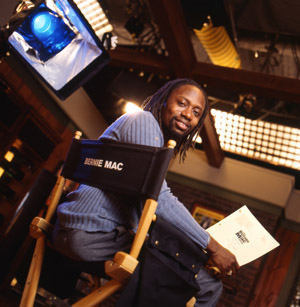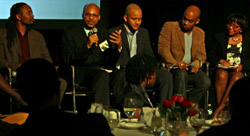Alumnus Brings on the Funny as Writer for Psych, Frasier
-
-
slice.mit.edu
- 3
Filed Under
Recommended

Ever the class clown, Patterson thought a show about him and his friend would be a hit. So on a whim in 1995 he scrutinized popular comedies—Frasier, Seinfeld, Mad About You, and Ellen—with an engineer's analytical, process-oriented approach to understand their structure then wrote spec scripts. "The first thing I realized is that a TV show about me and my friend Rich would not be funny," Patterson says.
Still, he continued writing and left a graduate psychology program at Vanderbilt after landing a prestigious Disney|ABC Writing Fellowship—his entrée into Hollywood. He learned about pitching and fleshing out ideas and writing scripts from industry insiders and forged important connections with executives that helped him move up the ranks. During his fellowship, for example, he met former Harvard Lampoon writers Al Jean and Mike Reiss, who offered advice, an internship, and, finally, a staff writer position on Teen Angel. Before long, Patterson was writing for Frasier then The Bernie Mac Show. He's especially proud of his work on Frasier. "That was like a dream come true," he says. "I was a huge fan before I became a writer. It was the first spec script I wrote." Most thrilling was tape night, when he could witness a live audience responding to his jokes. "It gives you a rush. It's something you can't get anywhere else," he says.
These days, Patterson is a coexecutive producer on USA Network's dramedy Psychabout a fake psychic detective. Television writing is highly collaborative. A team of writers and producers (who are senior-level writers who also work on set throughout an episode's production) brainstorm story arcs and characters. Then, one or sometimes two people end up writing the actual script. Many writers new to the LA scene, Patterson says, struggle with assimilating their writing habits with the group collaboration and strict deadlines of TV, but he was well-suited to the process and structure. "At MIT you have to learn how to organize yourself within time constraints," he says. "Television shows in general follow a universal structure," which doesn't mean the stories themselves are formulaic. "But there are formulas in television you can learn and exercise."

Patterson has written six Psych episodes. Much of his time is spent on production work. He's involved with the casting process and can be called upon to rewrite scenes when necessary, usually prompted by budget constraints or feasibility issues. One recent episode, for example, had the main characters white-water rafting over a waterfall. But there aren't any waterfalls this time of year in Vancouver where the show is filmed. So Patterson and the team had to quick rework the script.
He just wrapped up production on Psych, which he works on late January through mid-November. In his spare time, Patterson tries to write at least one pilot a year and is currently writing an animated one for Fox and another for Nickelodeon. Eventually, he wants to create and executive produce his own series.
In a world where success is often measured by the depth of one's IMDB page, it's important to put things into perspective—something Patterson does easily. "Being a Hollywood insider is fun, but it's also scary," he says. "The nature of Hollywood is that you're only an insider for so long."
Psych vs. The Mentalist
Psych fans—ever wonder what the Psych team really thinks of The Mentalist? Are those jokes that seem to appear in every episode ridicule or playful banter? (If you're unaware, the premise behind The Mentalist is a clear rip-off of Psych.) "It was frustrating at first," Patterson says. "It felt like people were not acknowledging how similar it was to Psych." But The Mentalist's tone is different and now Patterson is confident that one's success will only bolster the other.








Comments
yo
Sun, 09/12/2010 5:07am
hehe!
ariya
Tue, 12/22/2009 2:54am
thanks for your article, its very helpfull for me...success for you friend..
Dianne Glennon
Wed, 11/18/2009 5:55pm
Thank you for sharing this with the community. I am a big Psych fan - it is hugely funny and we walk around quoting Gus and Sean like a couple of kids - especially the Indian food dinner scene. I feel somehow validated knowing that an MIT grad has something to do with such a great show. And The Mentalist - no contest there. I like the show but it is completely different. There's also Castle - they all have the same basic formula and they're all good.